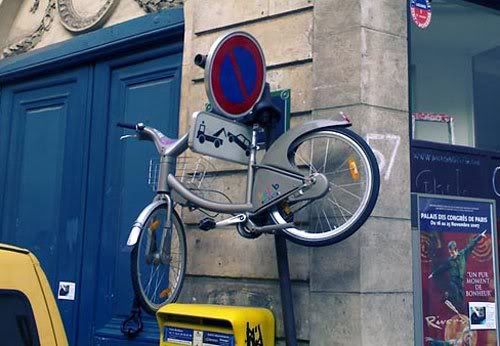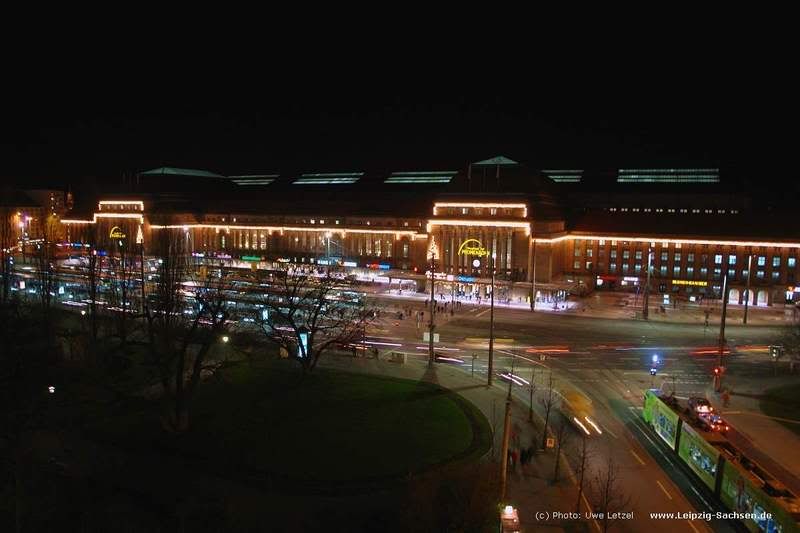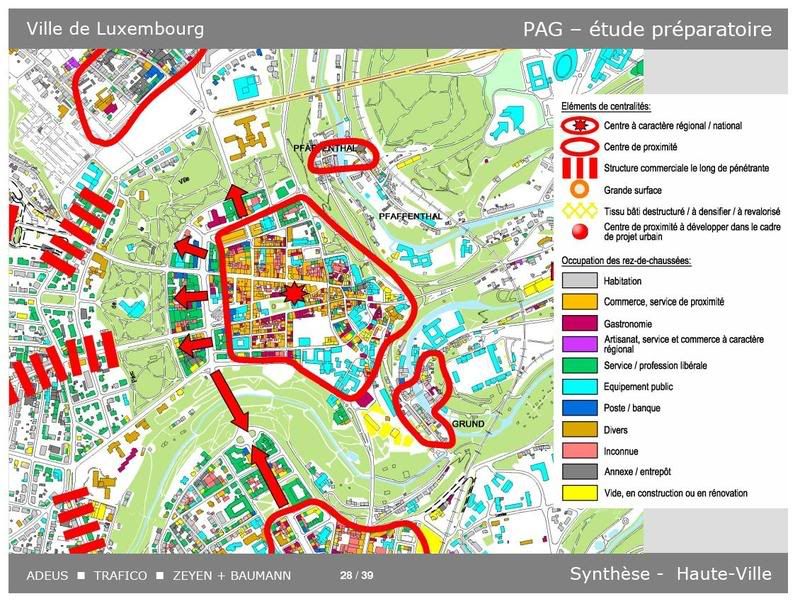Just in case you're interested. Place of work: the Kehlsteinhaus, near Berchtesgaden, I guess.
6.10.08
I am African
Just in case you're interested. Place of work: the Kehlsteinhaus, near Berchtesgaden, I guess.
13.8.08
9.6.08
Tramway invading Limpertsberg
According to L'Essentiel, the "syndicat du Limpertsberg" is protesting against the fact that the tramway is going to corrupt their very nice neighbourhood. They were not consulted, and they call it "an invasion".
At the same time, at http://service.vdl.lu/forum/read.php?4,4102,4103#msg-4103 (the City of Luxembourg online forum) someone is asking for a direct bus line between Limpertsberg and Kirchberg. Others demand for more peripheral direct connections (meaning: if you don't live near Centre Hammilius or the Gare, chances are that you'll have to take two different buses to go anywhere).
Me, I've never been to the Limpertsberg village. I'm a city guy and I fell sick in deserted open spaces, full of cows and ticks, but I do believe that if people have chosen to live in the countryside, away from the turbulent city centre, they should be respected.
More posts about the tramway here.
16.4.08
Big political issue
15.4.08
OLEFA: The next generation school portal: Made in Luxembourg
The school-communities of 27 townships and over 50 schools in Luxembourg currently use OLEFA, 8.948 students and teachers are using the system by now. There are 25.209 collaborative wiki pages. 116.104 books are registered in 81 libraries."
From olefaschool.org. More details also at kirps.com.
14.4.08
Peeping Tom in Luxembourg
A man has been arrested this weekend, for using a mini camera hidden in his shoe to look up skirts, at Auchan. WTF?!
7.4.08
Where I Lay My Head (and my bones...) Is Home: Some statistical facts about dual citizenship in Luxembourg
Surprised? I'm not.
And I'm also not too keen on the traditional idea of patriotism. In fact, I think most of it is a bunch of nonsense, and "national" traditions just a model for those who are too lazy or too stupid to think for themselves. But I do believe in citizenship, in responsibility, in rights and duties. The kind of citizenship built in Europe after the French Revolution (but not in France, it seems...).
There is no true citizenship without integration. The dual citizenship law in Luxembourg will only serve economical purposes. Luxembourg needs citizens, not "nationals", and those can not be created by law. True integration will come later, when people will be willing to die in Luxembourg. That's why I see no point in the "patriotic debate". It's only a question of money, a question of labour force. The patriotic debate will eventually boost up some clever (sorry for the incoherence) extreme right political formation, and that's it.
I also find the linguistic question to be a joke in a country with three official languages ("triglossie", they call it, in French...). But the language tests can be a good thing. In fact language tests can help improve the Luxembourgish statistics on accidents at work. It's different to be able to understand "José, bring me that cement bucket" (level A2) or "José, bring me that cement bucket without falling off the scaffold" (level B1).
5.4.08
Vel'oh! hoax
Someone at RTL Radio Luxembourg thougth that the Vel'ohs were just asking for an April Fools' Day hoax ... and shot himself in the foot!
The hoax was about swapping an old bicycle for a Vel-oh!'s annual subscription. The City decided to fight back, and play the game:
"La Ville de Luxembourg s'était inspirée de l'action «poisson d'avril» organisée par RTL Radio Lëtzebuerg le 1er avril pour proposer aux intéressés de déposer leurs vieux vélos le 2 avril entre 15h et 16h devant l'Hôtel de Ville, place Guillaume II. En contrepartie la ville a pu offrir 35 abonnements d'un an à vel'oh!
La ville projette d'utiliser tous ou une partie des vieux vélos dans le cadre de l'action «Mei oder manner», ayant pour but d'engager les enfants des écoles primaires à prendre leurs responsabilités et de susciter leur compréhension envers la nature et l'environnement.
Merci à tous ceux qui ont joué le jeu !" (in vdl.lu)
3.4.08
The old "Veräinshaus" in Differdange
I don't understand this country. Is it so difficult to see some cultural and patrimonial value in this XIX century (the entrance gate is older) building in Differdange?
The fabrique d'Église(laymen association in catholic parishes) wants to sell it (one million euros). The Secretary of State for Culture wants to preserve it. According to L'Essentiel, this is another political dispute between central and local governments over the possession of land.

Either way, couldn't they preserve the old building and use it for community purposes? Just the idea of preserving it would serve per se a very strong community purpose - it would help keeping the city's collective memory and it would strengthen the sense of identity of its habitants.
I'm sure they could find another place to build this ... thing:
26.3.08
Vel'oh: Vade retro, satana!
The Wort has just discovered that Luxembourg and the Vel'oh bicycle system will become a lucrative business for JCDecaux, as confirmed by Jean-Sebastien Decaux, the executive director of the company.
I'm outraged. I feel betrayed. We all thought that JC Decaux was a non-profit organization, but no, it's a market economy firm.
I want to scream: "____________" (here you can choose: "¡No Pasarán!" or "Vade retro, satana!")
25.3.08
Bigfoot in Luxembourg
Nice buzz for the movie (check the director's name). But who needed the video confession, at least this side of the Atlantic?
21.3.08
Luxembourg drivers: are they truly polite?
From the Wort: "Luxemburger sind höfliche Autofahrer". I agree that it's not easy to find an agressive driver in Luxembourg. But "polite", "courteous"? "Höflich" can also be translated has "unrude", which is more appropriate in this case. A tree is unrude. A stone wall is unrude. Luxembourgish drivers (or Luxembourg drivers) are not rude, they drive peacefully and respect traffic rules (when they're aware of them...). But this is not being polite: being polite is to adequate your speed near a junction to let someone turn left in front of you, even if you have the right of way. Being polite is to aknowledge the existence of other drivers and don't wait half a minute before moving so that you don't limit the number of cars that make it through before the light turns red again.
Robert A. Heinlein once said that politeness is a sine qua non of civilization. I totally agree with him.
17.3.08
Diesel taxes in Europe
 "The European Commission says the wide variation in rates of diesel (officially known as gas oil) taxes creates distortions in the road haulage market – and also increases environmental damage by encouraging “fuel tourism” by hauliers (i.e. making special journeys or using longer routes in order to fill up in a country with low taxes). Also, since diesel and petrol have similar impacts, especially from the point of view of CO2 emissions, there is no environmental reason for the two minimum rates to differ. The Commission is therefore proposing to raise the minimum rate on diesel up to the minimum rate on petrol."
"The European Commission says the wide variation in rates of diesel (officially known as gas oil) taxes creates distortions in the road haulage market – and also increases environmental damage by encouraging “fuel tourism” by hauliers (i.e. making special journeys or using longer routes in order to fill up in a country with low taxes). Also, since diesel and petrol have similar impacts, especially from the point of view of CO2 emissions, there is no environmental reason for the two minimum rates to differ. The Commission is therefore proposing to raise the minimum rate on diesel up to the minimum rate on petrol."
(in http://www.europarl.europa.eu/news/expert/infopress_page/044-23872-070-03-11-907-20080312IPR23862-10-03-2008-2008-true/default_en.htm)
12.3.08
City of Luxembourg: Plan d'aménagement général (PAG)
- it's very positive to finally acknowledge that the saturation of the Hamilius-Gare axis is one of the major problems concerning public transportation in the city; the solution is, of course, to create other bus-train(-tram?) interfaces, namely in Kircheberg, Gasperich and Howald (East, South and West; the Northern entrance to the city poses a different problem, as the highway is still under construction);
- sadly, there are no plans for closing the highway ring around the city: if you're in Strassen and want to go to the airport, it's faster to drive through town, and this is not a good sign;
- a second inner ring (with a speed limit around 70-80 km/h, where possible) would help distributing the traffic coming from the highway; this function is now taken by some of the radiating axes and, what's worst, by the streets surrounding the city centre, which is not good; this would be the right place to build P&Rs and the new bus-train(-tram?) interfaces;
- is it reasonable to expect that the city will continue to grow has in the last 10 years? What will happen if banking laws and TVA are imposed and harmonized through out Europe?
- promote the installation of families in the city is not has easy has to reduce traffic or paint new bicycle lanes: people will have to be convinced that they are allowed to be part of the city, and that they can have a life outside the "oxygen bubbles" provided by the proximity of their countries of origin (for the frontaliers) or by the institutional/social support from their employers (for the European civil servants); for to really establish themselves in real Luxembourg, people need to know that they will be able to send their children to a good school, and to have European quality health care (not just cheap), and that they can go to a supermarket or shop other than Auchan and get a good friendly service even if they can only communicate using the second official language of the country. Of course this has nothing to do with traffic, but the population issue is (well) included in this "Plan d'aménagement général";
- only recently I was aware of the existence of (another) controversy about the demolition of Luxexpo to liberate some space for the tramway. I can only have one opinion about this: implode the damn thing!
8.3.08
MUPI in Luxembourg (like in "Martine in Luxembourg" or "Noddy in Luxembourg")
 We already knew that Santa was living in Luxembourg. After the most recent anti-MUPI fairy tale reactions (small print: "although our main business is banking, we don't want your filthy capitalist advertising in our city"), I've just been informed that Snow White is also moving into town, and she's bringing the Dwarfs with her (not all of them, Grumpy is staying in Liechtenstein; and, by the way, Bambi is still happily living in Switzerland, where he relocated to after the fall of the Weimar Republic).
We already knew that Santa was living in Luxembourg. After the most recent anti-MUPI fairy tale reactions (small print: "although our main business is banking, we don't want your filthy capitalist advertising in our city"), I've just been informed that Snow White is also moving into town, and she's bringing the Dwarfs with her (not all of them, Grumpy is staying in Liechtenstein; and, by the way, Bambi is still happily living in Switzerland, where he relocated to after the fall of the Weimar Republic).
(previous posts about the free bicycle system and the contract with JC Decaux here and here)
27.2.08
Vel'oh!
26.2.08
More problems with the bicycle contract in Luxembourg City
 The free bicycle system - and the contract with JC Decaux - is still fuelling the political debate in Luxembourg City. Some of the MUPIs (Mobilier Urban pour l'information) were removed, and it seems that others will follow, because their location was said to be dangerous for traffic visibility. A written approval from the Ministry of Culture is also missing, according to the opposition. "This fairy tale comes from people who have no clue about public tenders", says the City Council.
The free bicycle system - and the contract with JC Decaux - is still fuelling the political debate in Luxembourg City. Some of the MUPIs (Mobilier Urban pour l'information) were removed, and it seems that others will follow, because their location was said to be dangerous for traffic visibility. A written approval from the Ministry of Culture is also missing, according to the opposition. "This fairy tale comes from people who have no clue about public tenders", says the City Council.
The result of all this is obvious: the City will have to loose a lot of money to honor the contract with JC Decaux, and the opposition will have a very good argument for the coming election, although they don't seem to have any solutions or a positive attitude towards pollution or traffic increase (the bicycles are not to supposed to solve any traffic or pollution problems, they're just a very good way to start changing, to say "we care, we are aware of the problem, we are doing something"). This Friday the City Council will present a preliminary study for a Plan d’aménagement général that will deal with a foreseen increase of residents, jobs and number of cars entering the city everyday. First councillor François Bausch (from the Greens, and best known for putting his money where his mouth is: I'm not the only one to see him cruising trough the city in his bicycle almost everyday) said that by 2020 the Council expects to have tripled the offer of public transportation and doubled the numbers of soft mobility (walking, cycling).
More comments (in French) here and here.
22.2.08
The new bus lane in route d'Esch
Some facts about the new most discussed bus lane in route d'Esch:
1. When you have two lanes of traffic and you decide that one of them is going to be used only by buses (and by bicycles, it seems), you can not expect that all the drivers that were previously using that lane will leave their car at home and jump into the next bus. You can expect bigger traffic jams in the only lane now open for private cars.
2. We have a diesel pollution problem (in Luxembourg, high levels of nitrogen dioxide, in Brussels, fine particles: that's the geography of money - new diesel cars with particle filters here, old diesel cars without particle filters in Belgium - both very polluting and bad for your lungs, although "environmental-friendly" and government-supported because of the lower levels of CO2).
3. When you have a pollution problem, you can not expected the average citizen to decide on his own to park his new flashy just-bought-in-the-AutoFestival-diesel-burning bagnole and take the bus or the train, because he wants to show it to all his workmates and neighbours, and taking the bus or the train is soooo working class (and we are not working class, nor immigrants, we are transfrontaliers, and expatriates).
4. You can only rely on the City Council to take the good decision of imposing bus lanes, and forcing a lot of us to use public transportation. That's what they were elected for: to implement their decisions and their political program.
 (Feel free to use this banner on your own blog)
(Feel free to use this banner on your own blog)
19.2.08
Metro subway in Luxembourg
(in http://www.citytunnelleipzig.de/english/english_information.html)

Let's get real?
 Leipzig's Central Station is one of the largest terminus train stations in Europe. A few years ago sections of the Station were altered to house a state-of-the-art shopping and service centre.
Leipzig's Central Station is one of the largest terminus train stations in Europe. A few years ago sections of the Station were altered to house a state-of-the-art shopping and service centre.More posts about the tramway here.
14.2.08
Living in Luxembourg

"In order to involve citizens in the discussion and decision making processes concerning the development of the city, the council of aldermen and the mayor cordially invites you to participate in an information session, during which the progress made in the implementation of the coalition agreements between the Democratic Party and the Green Party during 2007 will be presented."
For the first time (that I know), English and French translations will be provided. Is this city getting nicer or what?


























